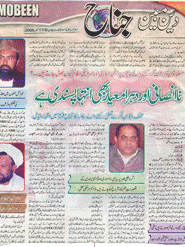Budget deficit control measures seems unrealistic
Shortfall to increase on missed taxation targets, weighty grants
Tax collection of 1.25 trillion rupees, increase in basic sales tax and modified import duties on 300 luxury goods may not prove very effective due to high political, economic and international pressures.
Meeting the deficit target would require drastic efforts which don’t seem realistic in the current circumstances, said Dr. Murtaza Mughal, President of Pakistan Economy Watch in a statement issued here Friday.
Giving Rs 1000 a month to one million poor households and 20 percent increase in the salaries and pensions of government workers will have no significant affect on poor and it seems to be a politically motivated statement.
“Masses will pay dearly for the decisions of the Government to cut oil subsidies and allocations in some important heads,” added Mughal.
The budget gap is expected to narrow to 4.7 percent of GDP in the fiscal, Finance Minister Naveed Qamar said in his budget speech. But, it seems a governmental announcement as concrete measures have not been taken in this direction.
The government’s statements are too optimistic to be trusted because there will be too many slippages, especially apex tax collecting body.
“Government needs to narrow the budget deficit to reduce reliance on loans from the State Bank of Pakistan, which have pushed inflation to a 30-year high of 19.3 percent,” said Mughal adding that it’s like printing excessive money.
The Government decision to float bonds on the stock market rather than borrow from the central bank will be counter productive until the political turmoil is settled.
Spending will jump 30 percent to 2.01 trillion rupees next fiscal year from 1.55 trillion rupees in the previous 12 months. Outlays on subsidies on items including food, power and fertilizer are forecast at 295 billion rupees.
Ruling coalition is facing challenges from a wider budget shortfall and slowing economic growth. Food shortages in recent months have stoked consumer prices and caused unrest in country where two-thirds of the population survive on less than USD 2 a day.
Country needs more foreign investment to encourage economic growth which will weaken this year to as low as 5.5 percent after averaging 7 percent in the five years from 2004. Government has reduced duties on some raw materials to boost manufacturing and provided incentives for investment in agriculture aiming to boost two sectors that underperformed this fiscal year.
The State Bank of Pakistan on May 23 unexpectedly raised borrowing costs by 1.5 percentage points to 12 percent, the second increase this year, to curb inflation; will such steps work in future?





